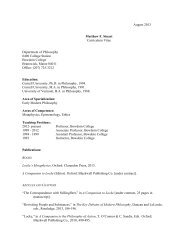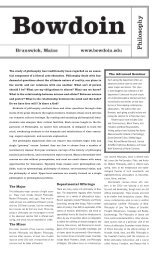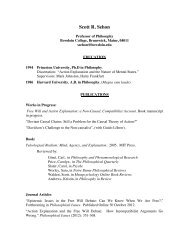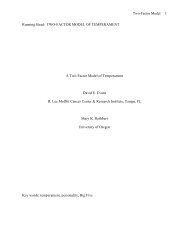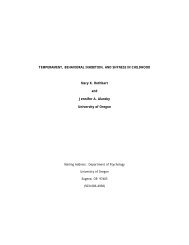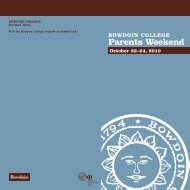Lincoln's Unfinished Work - Bowdoin College
Lincoln's Unfinished Work - Bowdoin College
Lincoln's Unfinished Work - Bowdoin College
You also want an ePaper? Increase the reach of your titles
YUMPU automatically turns print PDFs into web optimized ePapers that Google loves.
Lincoln’s <strong>Unfinished</strong> <strong>Work</strong><br />
their conversion to the cause of black freedom. In A Dry White Season, when the<br />
white protagonist — a teacher who witnesses the violence of Apartheid — is<br />
fired, his wife admonishes him: “You have to choose your own people, or you<br />
have no people.” In The Long Walk Home, the protagonist Miriam, a middle-class<br />
white woman participating in the Montgomery Bus Boycott, suffers her<br />
husband's abandonment.<br />
Some of the freedom struggle films performed solidly at the box office, and a<br />
few garnered some critical acclaim. But none proved successful enough for the<br />
notoriously risk-averse Hollywood establishment. By the turn of the century, the<br />
American public had apparently had enough with racial sanctimony, white guilt,<br />
and boring history. Indeed, Civil War stories still made it to the screen; the Lost-<br />
Cause paean Gods and Generals (2003), could not have been made had not Glory<br />
made such ground safe — but gone was the sharp edge of racial politics and<br />
white agony. While race placed a minor role in Ang Lee's Ride with the Devil<br />
(1999) — the key black character plays a Confederate guerilla — the film<br />
adaptation of Cold Mountain (2003) was set so snugly in white Appalachia that<br />
the issue barely arose.<br />
The freedom struggle formula devolved. One bifurcated strand led toward<br />
"black" stories that appealed to a vague culturally nationalist sensibility: Spike<br />
Lee's Malcolm X (1992), John Singleton's Rosewood (1997), and Mario Van<br />
Peebles's Panther (1995). More rarely, it was preserved in stories that centered on<br />
white protagonists, such Michael Apted's Amazing Grace (2006), the story of Great<br />
Britain's great champion of slave trade abolition, William Wilberforce.<br />
Spielberg's earlier venture into the history of slavery, Amistad (1997), was of<br />
this ilk. The film retains vague hints of caste conversion, as in the figure of lead<br />
attorney Roger Baldwin, whom it depicts as a pragmatist driven to take up the<br />
cause of slave rebels in spite of himself, whereas the real Roger Baldwin<br />
represented the Amistad captives out of a deep and longstanding commitment to<br />
the plight of the less fortunate. Amistad also sought to tell "black" stories,<br />
whether of the slave rebel Cinque, or of Theodore Joadson, the fictional free<br />
African American who (as black characters do in Lincoln) serves as moral<br />
counter-weight to the political pragmatism impelling the primary action.<br />
3<br />
Patrick Rael




